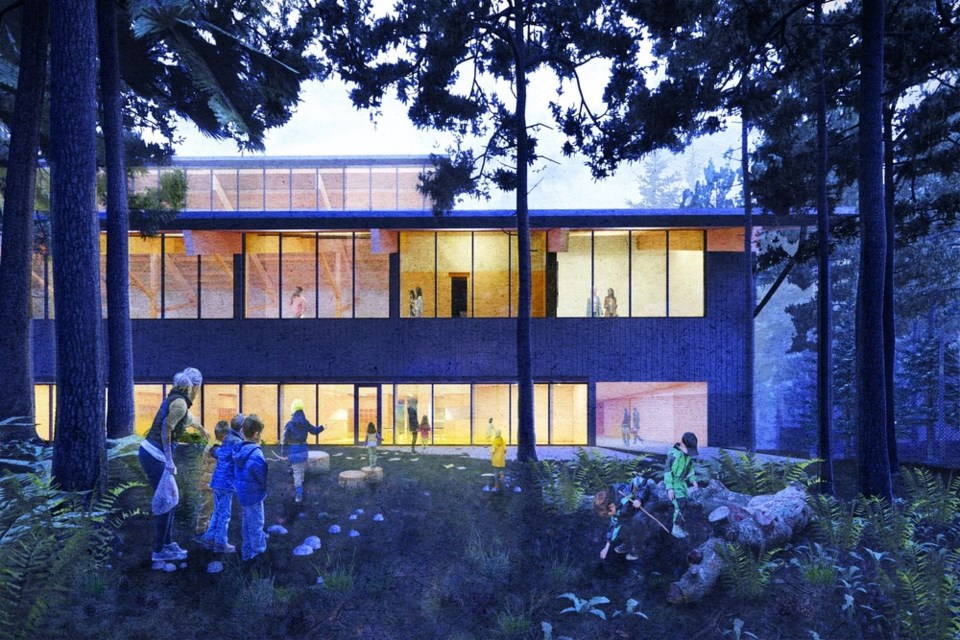More than ever before, high-quality early learning and childcare programs are vital to the collective strength and resilience of communities. As we continue our ongoing recovery from the COVID-19 pandemic, experts are calling attention to the importance of early learning and childcare to enable children, families and communities to thrive.
Capilano University (CapU) – home to an international centre of excellence in early childhood care and education (ECCE), research and practice – will leverage its significant expertise in the field to create a new Centre for Childhood Studies.
“Capilano University’s Centre for Childhood Studies will set learners of all ages up for success. It will ensure a strong start for children and support their parents, who are pursuing their own studies. This new Centre will more than double the number of childcare spaces available on campus while also enhancing the learning environment for students in the early childhood educators program,” Anne Kang, Minister of Advanced Education and Skills Training, said in a provincial government announcement.
“This will be an innovative space where ECE research will be conducted to support the need for high-quality education among early childhood educators in B.C.,” says Brad Martin, CapU’s Dean of Education, Health and Human Development.
The two-storey, 23,000-square-foot, purpose-built facility scheduled to open in 2024 will house an Early Childhood Centre that provides students with opportunities to learn with educators and faculty how to address the complexities of working with children and families in the 21st century. It will be a space where researchers and educators can develop a deeper understanding of education in the early years by focusing on arts-based and innovative pedagogies for children, faculty and students.
Plans for the Centre align with the growing demand for the university’s ECCE degree and diploma programs. These “signature programs” have earned CapU a leadership position in the field of early childhood education.
“The ECCE degree program is one of four such programs offered in Canada and the only one in Western Canada,” says Martin. “Our exceptional faculty members are recognized in their field for innovative research and teaching practices.”
Another driving factor is the “pressing need for highly qualified educators and a shortage of childcare spaces,” Martin adds. “A lack of early learning and childcare spaces is a significant barrier for parents and families in many parts of the country. That’s why federal and provincial governments are investing in new childcare spaces. We are taking action to ensure the next generation of early childhood educators receives the best possible education to meet the needs of the 21st century.”
There is also mounting evidence that investment in early childhood education results in significant economic and societal benefits, including increased workforce diversification, a levelling of the playing field for disadvantaged families, and more inclusive and equitable communities.
Accessible early learning and childcare directly correlates to overcoming inter-generational poverty and reducing gender income inequality, and it’s vital for economic development that supports healthy families. This new Centre will serve as a welcoming and inclusive space where every child and family can feel they belong.
Early childhood educators create environments where young children can investigate, invent, build awareness of social justice and inclusion, and create a connection to land, culture, community and place. They guide them through learning the virtues and skills that will enable their contribution to a diverse, equitable and sustainable world.
With this new building, CapU will double the number of childcare spaces on campus and integrate applied research with practice. Large, open research and studio spaces will enable community engagement and a setting where CapU can convene early learning experts and policymakers to drive change.
Martin adds that funding support for the new Centre illustrates that such goals resonate widely. In addition to $9.46 million from the Province of B.C. and $4.14 million from CapU, a fundraising campaign has raised $4.6 million of the $5 million target towards a total project cost of $18.6 million.
CapU is well on its way to making its “hub for thought leadership in early childhood care and education” a reality.
To contribute, donate online or visit the Centre for Childhood Studies section of the CapU website for more details.



